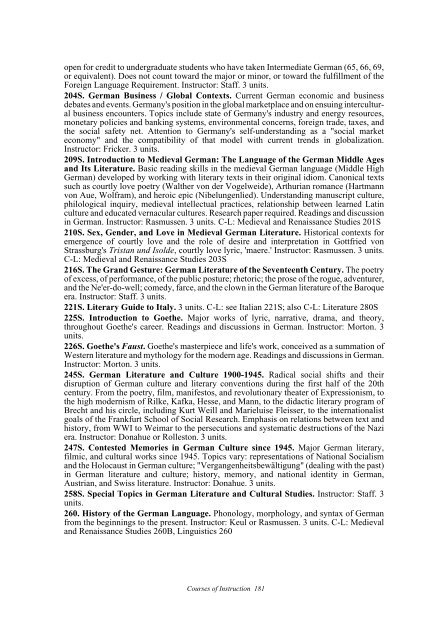Duke University 2008-2009 - Office of the Registrar - Duke University
Duke University 2008-2009 - Office of the Registrar - Duke University
Duke University 2008-2009 - Office of the Registrar - Duke University
Create successful ePaper yourself
Turn your PDF publications into a flip-book with our unique Google optimized e-Paper software.
open for credit to undergraduate students who have taken Intermediate German (65, 66, 69,<br />
or equivalent). Does not count toward <strong>the</strong> major or minor, or toward <strong>the</strong> fulfillment <strong>of</strong> <strong>the</strong><br />
Foreign Language Requirement. Instructor: Staff. 3 units.<br />
204S. German Business / Global Contexts. Current German economic and business<br />
debates and events. Germany's position in <strong>the</strong> global marketplace and on ensuing intercultural<br />
business encounters. Topics include state <strong>of</strong> Germany's industry and energy resources,<br />
monetary policies and banking systems, environmental concerns, foreign trade, taxes, and<br />
<strong>the</strong> social safety net. Attention to Germany's self-understanding as a "social market<br />
economy" and <strong>the</strong> compatibility <strong>of</strong> that model with current trends in globalization.<br />
Instructor: Fricker. 3 units.<br />
209S. Introduction to Medieval German: The Language <strong>of</strong> <strong>the</strong> German Middle Ages<br />
and Its Literature. Basic reading skills in <strong>the</strong> medieval German language (Middle High<br />
German) developed by working with literary texts in <strong>the</strong>ir original idiom. Canonical texts<br />
such as courtly love poetry (Wal<strong>the</strong>r von der Vogelweide), Arthurian romance (Hartmann<br />
von Aue, Wolfram), and heroic epic (Nibelungenlied). Understanding manuscript culture,<br />
philological inquiry, medieval intellectual practices, relationship between learned Latin<br />
culture and educated vernacular cultures. Research paper required. Readings and discussion<br />
in German. Instructor: Rasmussen. 3 units. C-L: Medieval and Renaissance Studies 201S<br />
210S. Sex, Gender, and Love in Medieval German Literature. Historical contexts for<br />
emergence <strong>of</strong> courtly love and <strong>the</strong> role <strong>of</strong> desire and interpretation in Gottfried von<br />
Strassburg's Tristan und Isolde, courtly love lyric, 'maere.' Instructor: Rasmussen. 3 units.<br />
C-L: Medieval and Renaissance Studies 203S<br />
216S. The Grand Gesture: German Literature <strong>of</strong> <strong>the</strong> Seventeenth Century. The poetry<br />
<strong>of</strong> excess, <strong>of</strong> performance, <strong>of</strong> <strong>the</strong> public posture; rhetoric; <strong>the</strong> prose <strong>of</strong> <strong>the</strong> rogue, adventurer,<br />
and <strong>the</strong> Ne'er-do-well; comedy, farce, and <strong>the</strong> clown in <strong>the</strong> German literature <strong>of</strong> <strong>the</strong> Baroque<br />
era. Instructor: Staff. 3 units.<br />
221S. Literary Guide to Italy. 3 units. C-L: see Italian 221S; also C-L: Literature 280S<br />
225S. Introduction to Goe<strong>the</strong>. Major works <strong>of</strong> lyric, narrative, drama, and <strong>the</strong>ory,<br />
throughout Goe<strong>the</strong>'s career. Readings and discussions in German. Instructor: Morton. 3<br />
units.<br />
226S. Goe<strong>the</strong>'s Faust. Goe<strong>the</strong>'s masterpiece and life's work, conceived as a summation <strong>of</strong><br />
Western literature and mythology for <strong>the</strong> modern age. Readings and discussions in German.<br />
Instructor: Morton. 3 units.<br />
245S. German Literature and Culture 1900-1945. Radical social shifts and <strong>the</strong>ir<br />
disruption <strong>of</strong> German culture and literary conventions during <strong>the</strong> first half <strong>of</strong> <strong>the</strong> 20th<br />
century. From <strong>the</strong> poetry, film, manifestos, and revolutionary <strong>the</strong>ater <strong>of</strong> Expressionism, to<br />
<strong>the</strong> high modernism <strong>of</strong> Rilke, Kafka, Hesse, and Mann, to <strong>the</strong> didactic literary program <strong>of</strong><br />
Brecht and his circle, including Kurt Weill and Marieluise Fleisser, to <strong>the</strong> internationalist<br />
goals <strong>of</strong> <strong>the</strong> Frankfurt School <strong>of</strong> Social Research. Emphasis on relations between text and<br />
history, from WWI to Weimar to <strong>the</strong> persecutions and systematic destructions <strong>of</strong> <strong>the</strong> Nazi<br />
era. Instructor: Donahue or Rolleston. 3 units.<br />
247S. Contested Memories in German Culture since 1945. Major German literary,<br />
filmic, and cultural works since 1945. Topics vary: representations <strong>of</strong> National Socialism<br />
and <strong>the</strong> Holocaust in German culture; "Vergangenheitsbewältigung" (dealing with <strong>the</strong> past)<br />
in German literature and culture; history, memory, and national identity in German,<br />
Austrian, and Swiss literature. Instructor: Donahue. 3 units.<br />
258S. Special Topics in German Literature and Cultural Studies. Instructor: Staff. 3<br />
units.<br />
260. History <strong>of</strong> <strong>the</strong> German Language. Phonology, morphology, and syntax <strong>of</strong> German<br />
from <strong>the</strong> beginnings to <strong>the</strong> present. Instructor: Keul or Rasmussen. 3 units. C-L: Medieval<br />
and Renaissance Studies 260B, Linguistics 260<br />
Courses <strong>of</strong> Instruction 181









